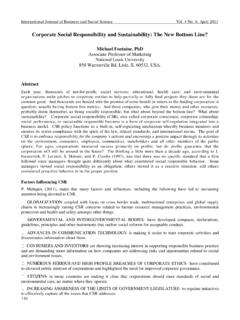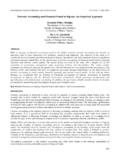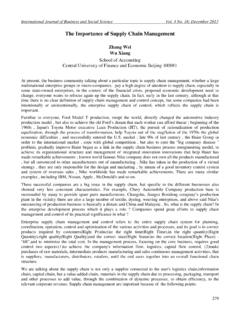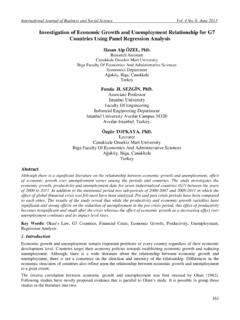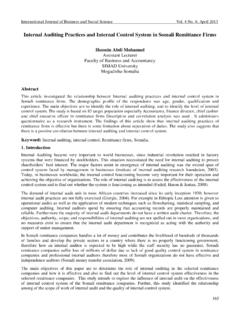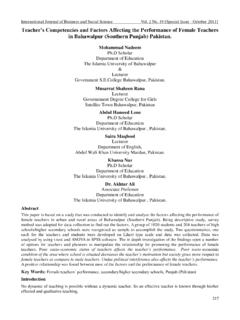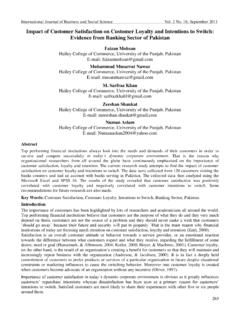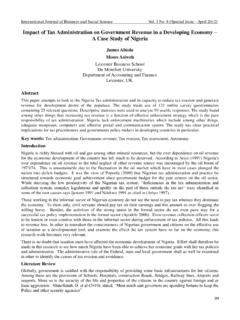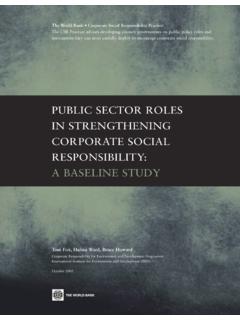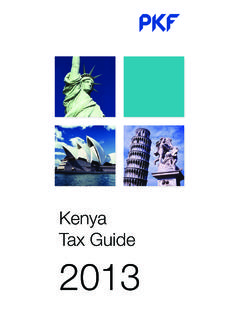Transcription of Corporate Social Responsibility in Ghana - Social science
1 International Journal of Business and Social science Vol. 2 No. 17 107 Corporate Social Responsibility in Ghana Kwesi Amponsah-Tawiah, PhD (Corresponding Author) University of Ghana Business School Department of Organisation & Human Resource Management Box LG 78, Legon, Accra Ghana West Africa Email: Phone: 00233546238672 Kwasi Dartey-Baah, PhD University of Ghana Business School Department of Organisation & Human Resource Management Box LG 78 Legon, Accra Ghana West Africa Email: Phone.
2 00233209621292 Abstract Corporate Social Responsibility (CSR) an ethical, non-legislative, non-forcing approach to promoting responsible behaviours within organisations employs the central route of persuasion which consists of thoughtful considerations of arguments to achieve desired results. Studies suggest that attitudes that change through persuasion are more likely to persist temporally, resist counter persuasion and are more likely to predict behaviour (Petty & Cacioppo, 1986). It is therefore worthwhile examining the usage of the CSR concept in Ghana particularly in the mining industry where it enjoys some popularity.
3 This paper defined CSR as the strategic decision of an organisation to voluntary act upon the Social factors that have the potential of militating against the fulfillment of Corporate goals and examines the CSR concept in the Ghanaian mining industry. In Ghana the concept has tended to focus on the external environment to the neglect of the internal environment from where employees operate. Key Words: Corporate Social Responsibility , Africa, Ghana , Mining Industry. Introduction Organisations by their very nature have responsibilities ( , economic, ethical, legal and Social ) assigned to them by law, shareholders and other stakeholders and the society at large (Carroll, 1979; Brummer, 1991; Peattie, 1992).
4 These responsibilities they will have to diligently execute in order to ensure their continuous existence. In the academic and business literatures, often some of these responsibilities are discussed under the term Corporate Social Responsibility (CSR). CSR is a highly topical and debated subject. It has increasingly provided the focus for exploration of broad philosophical questions about the roles and responsibilities of companies and their relationships with the roles and responsibilities of governments and other stakeholders. Although everybody recognises that CSR is of growing concern in the current globalised economy, there is no sign of consensus on its definition, rules, structures or procedures.
5 Some see it as not more than sound business practice (Guerra, 2002; IOD, 2003). Some suggest it is just a forum for the business society interface (Lunheim, 2003; Waddock & Boyle, 1995). Others see it as a broader stakeholder consideration in business operations (Wheeler, Fabig & Boele, 2002; WBCSD, 2002). Various terminologies have been associated with the concept. This is confirmed by a survey of CSR education in Europe, which found 50 different labels associated with CSR modules, 40 different labels for CSR programmes and a number of terminologies synonymous to it (Matten & Moon, 2004).
6 The most popular terminologies which have become synonymous to the CSR concept are: business ethics, Corporate citizenship, sustainability or sustainable development, Corporate environmental management, business & society, business & governance, business & globalisation and stakeholder management. Reviews of CSR literature by Carroll (1999) and Garriga and Mele (2004) also reach similar conclusions regarding the multiplicity of aligned terms. Solomon (1991) argues that CSR is shared altruism or an act of philanthropy while the World Business Council for Sustainable Development (WBCSD) in its publication Making Good Business Sense gave a much broader outlook to the concept.
7 They defined CSR as the continuing commitment by business to behave ethically and contribute to economic development while improving the quality of life of the workforce and their families as well as of the local community and society at large (WBCSD, 2000:6). The Special Issue on Contemporary Issues in Business Studies Centre for Promoting Ideas, USA 108 Carroll (1983), also gives a broader outlook of the concept by defining it as the conduct of a business so that it is economically profitable, law abiding, ethical and socially be socially responsible means that profitability and obedience to the law are foremost conditions when discussing the firm s ethics and the extent to which it supports the society in which it exists with contributions of money, time and talent (1983: 608).
8 Not only does the definition of the concept differ in scope but also in terms of regions or countries. According to the WBCSD report Making Good Business Sense , Ghanaians see the concept as building capacity for sustainable livelihoods, respecting cultural differences and finding business opportunities in building the skills of employees, the community and government. The same report gives the Philippines definition of the concept as: giving back to society . This is not different from the traditional United States definition which sees the concept much more in terms of a philanthropic model.
9 Across Europe the concept is focussed much more on organisations operating their core business in a socially responsible way, complemented by investment in communities for purely business reasons. The above definitions point to the divergent nature of the concept ranging from environmental concerns through empowering local communities to donating to charity, all of which, according to the European model, are in the interest of the business. This further affirms the struggle for a consensus in definition, sparking calls for a clearer definition of the concept (Kok, van der Wiele, McKenna & Brown, 2001; Blowfield & Frynas, 2005).
10 Individuals, organisations and countries have defined the concept to reflect their national traditions, situations and peculiar challenges. However, of interest is the fact that the various definitions, though different in scope and focus, have a commonality of themes; ethics, employee issues, environment, governance and policy in the context of various stakeholders. Thus depending on the background of the individual, organisation or region defining the concept, emphasis will be placed on one or more themes to the disadvantage of the other components, which together make the concept meaningful.
